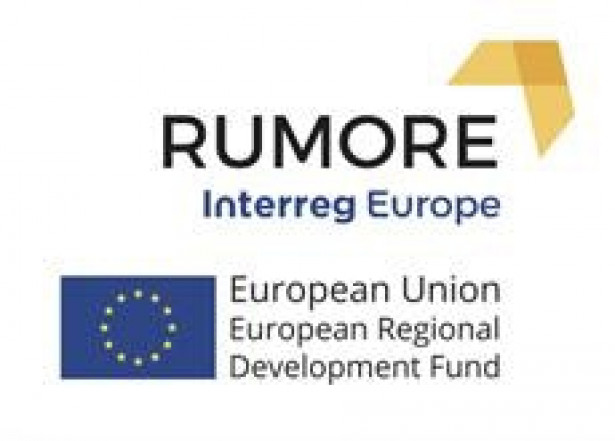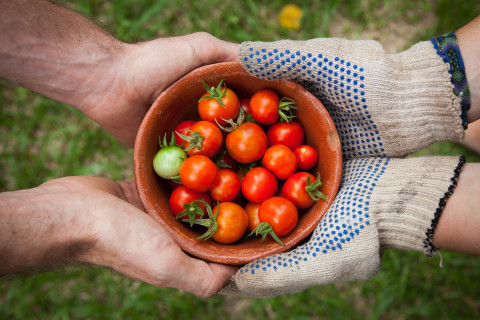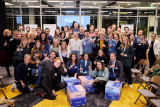Strengthening regional innovation, collaboration and knowledge exchange on the organic residual flow cycle.
In the field of the circular economy, the City of Amsterdam sees particular opportunities in redesigning the organic residual waste chains in the Amsterdam Metropolitan Area (MRA). The City is therefore participating in the European RUMORE project (Rural-Urban partnerships MOtivating Regional Economies), which is aimed at strengthening, inspiring and helping out start-up, innovative SMEs in the organic residual flow and agrifood sector.
In RUMORE, Amsterdam, Hamburg, Lombardy, Central Macedonia, Thessaloniki, the Lüneburg region, the Burgas Province (Bulgaria) and the Green Knowledge Port of Twente exchange knowledge and experiences. RUMORE aims to accelerate innovations and urban-rural knowledge exchange, with the intention of helping improve the policy instruments of each of the partners. In the case of Amsterdam, this is the Kansen voor West operational programme: https://www.kansenvoorwest2.nl/nl/
The priorities for Amsterdam are improving the chains of organic residual flows between the city and the surrounding region and reducing the ecological footprint. The emphasis is on research and companies that focus on the valuable use of organic waste streams and the development and marketing of new plant-based protein sources as alternatives to meat. In RUMORE, the City collaborates with knowledge institutes and entrepreneurs from the Amsterdam Metropolitan Area in a local stakeholder group. This joining of forces is expected to contribute to a necessary transition to a sustainable, circular food chain.
Members of the local stakeholder group include GRO Holland (produces oyster mushrooms on coffee grounds and makes vegetable, protein-rich products from them), The Dutch Weed Burger (products made from seaweed), GrowX (self-sufficient vertical farm: sprouts, herbs and lettuce, produced in a high-rise building and Amsterdam Metropolitan Solutions (conducts research into the optimal reuse of organic waste streams).
The stakeholders introduce themselves here: Stakeholder group RUMORE
(see the pdf below)
More information about the Amsterdam circular programme can be found at www.amsterdam.nl/circulair
More information on the EU RUMORE project and partners can be found at https://www.interregeurope.eu/rumore/
Other EU projects in which the City of Amsterdam takes part: https://www.amsterdam.nl/bestuur-organisatie/organisatie/ruimte-economie/amsterdam-europa/europese-projecten/
https://www.interregeurope.eu/rumore/

What is the goal of the project?
RUMORE brings together eight partners from five European countries and involves them in an intensive interregional learning process. In the course of the process, the project partners develop and test innovative approaches for the design and set up of policy instruments for integrated urban-rural development in innovation policies. The interregional learning process takes place in the form of local stakeholder workshops and Learning Events designed and organized as living labs. Within these, the regions involved identify and transfer good practices of cluster cooperation, stakeholder involvement and knowledge transfer and share experience on the development of action plans for improvement of their own policy instrument.
What is the result of the project?
The exchange of experience results in the development of new methods as well as concrete measures for improved policies in the field of regional innovation strategies. The progress of improvement is continuously supported by the three recurring Working Groups of the project:
Working Group "Influencing Regional Innovation Strategies"
Working Group "Institutionalising Urban-Rural Linkages"
Working Group "Empowering and Mobilising Innovation Actors"
Six policy instruments will be improved with an overall influenced amount of ca. 25 Million Euros. The implementation of the improved policy instruments is envisaged to facilitate the better delivery of regional innovation strategies from the urban agglomerations into the rural and peripheral surrounding areas. It will support cooperation activities between innovation actors, will raise the share of innovative companies in the partner regions and will increase the number of enterprises cooperating with research institutes.
What can other cities learn from your project?
RUMORE addresses funding priorities: “Support for innovation” and 2 “Support for SME competitiveness”. The project recognizes the need for integration of systemic innovation in the development of urban-rural interactions and the reduction of regional disparities. Often in countries there is division between the economically strong and economically weaker areas in certain regions as well as a lack of technic oriented universities and large innovative enterprises, especially in rural areas of a country. For this reason RUMORE puts efforts in improving the transfer of innovation from the urban cores to the rural areas and in supporting existing nuclei of innovation in the rural areas. Within the project good examples of urban-rural innovation linkages will be identified and included in the Multi-fund Programme.






